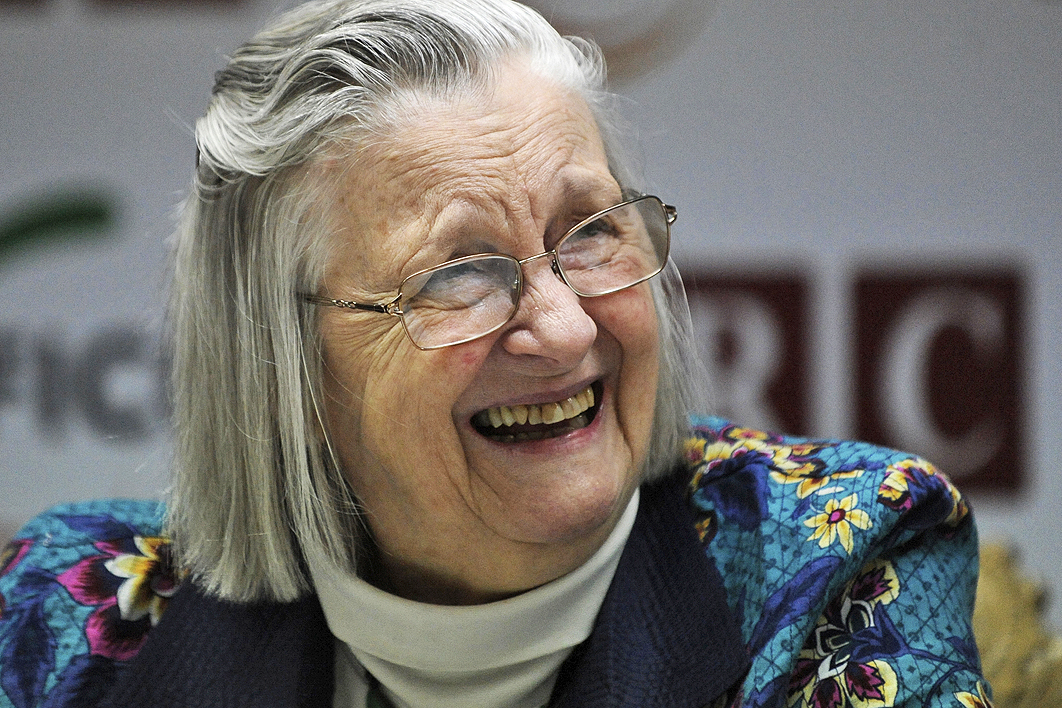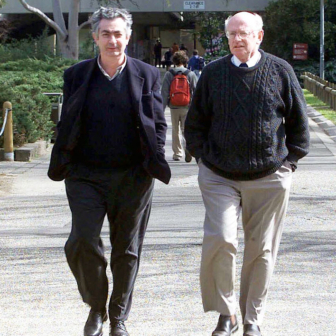The Common Good
By Robert Reich | Pisces | $39.99 | 208 pages
Elinor Ostrom’s Rules for Radicals: Cooperative Alternatives Beyond Markets and States
By Derek Wall | University of Chicago Press | $36.95 | 160 pages
Robert Reich starts his latest book, The Common Good, with an account of how and why its topic is “no longer fashionable.” Far from swimming against the tide, though, Reich is riding the crest of a wave. As you might expect of an intellectual with a flair for picking the next turning point in public debate, he has hit on what may well become the topic of the year. His book contributes to a rapidly growing literature on the commons — on communal ownership, public property and the public good — and neatly complements Derek Wall’s recently published Elinor Ostrom’s Rules for Radicals, a follow-up to his 2014 book The Commons in History.
As Wall’s title suggests, he focuses on the body of work left by Elinor Ostrom, a political economist at the University of Indiana who has the distinction of being the only female Nobel laureate in economics, awarded for her “analysis of economic governance, especially the commons.” Here, “the commons” fuses archaic and modern meanings. A term used in the middle ages to describe open land available for shared grazing and fuel collection, it is now more broadly applied to all public resources and shared ecosystems.
Ostrom died in 2012, before her life’s work began to show signs of paving the way for the next economic revolution. Her most widely read book, Governing the Commons (1990), still provides the best account of the many challenges involved in creating a commons-based economy, but Wall believes that her approach can be used to develop a way forward now that the orthodoxies we associate with “neoliberalism” are breaking up.
Ostrom was working in defiance of an aggressive consensus. Through the latter part of the twentieth century, the commons were generally dismissed by economists and policy-makers as a lost cause. It is only really in the past five years that there has been any concerted attempt to challenge that view, which gives a little force to Reich’s claim to be involved in turning the tide. In fact, both he and Wall generate rhetorical momentum by pitting their arguments against prevailing assumptions that, defunct as they may be, continue to shape government policy in Britain and America — and, of course, in Australia, where the commons approach has yet to capture significant media attention.
To demonstrate how far the principle of common good has receded in contemporary culture, Reich opens with an account of the brief but spectacular financial career of Martin Shkreli. Shkreli started out as a maverick trader, betting on prospective falls in the stock prices of biotech companies. In 2015 he started his own pharmaceuticals company and bought the rights to the drug Daraprim, the only approved treatment for a rare parasitic disease that takes hold in utero and leads to a range of severe conditions in affected infants. Realising he had a monopoly position, Shkreli arbitrarily hiked the price from US$13.50 to US$750 a dose.
The point Reich wants to make is not that he did it, but that he did it with such a cavalier sense of impunity. “The attempt to public shame is interesting,” Shkreli commented, “because everything we’ve done is legal.” When he was prosecuted for other forms of extortion that weren’t legal, he boasted that he expected a not-guilty verdict in two hours. “There are going to be jurors who will be fans of mine. I walk down the streets of New York and people shake my hand. They say, ‘I want to be just like you.’”
The court found him guilty. In a subsequent fraud case, concluded just last week, federal prosecutors recommended a jail sentence of at least fifteen years for offenses compounded by “inability to acknowledge that his actions constituted crimes.” The judge settled on seven years, midway between the wishes of the prosecution and those of Shkreli’s lawyer, who pleaded for a year to eighteen months on the grounds that his client suffered from a range of mental health problems including anxiety, depression and alcohol dependency.
Shkreli had continued to make recalcitrant statements during the course of the hearing, but appeared to show remorse as sentence was handed down. “I want the people who came here today to support me to understand one thing, the person to blame for me being here today is me,” he said. “I am terribly sorry I lost your trust. You deserve far better.”
The following day, social media forums were alight with rejoicing that “the most hated man in America” had got his just deserts, but the truth is that Shkreli is not solely to blame for his circumstances. He is the product of a way of thinking fostered on Wall Street, and his case is alarming because it is indicative of a pathology that is more cultural than individual.
Why invest in the common good, then, if someone is always going to exploit it? If human beings are essentially motivated by self-interest, surely it is better to acknowledge that, and design government policy accordingly? We might counter those questions with another. How on earth did people get to think like that? This is where the history comes in, and Derek Wall engages with it in some detail. There is a great deal of background to get through before we get to the foreground issues of how restoration of the commons might form the basis for a recovery from the ravages of neoliberalism.
If you’ve ever studied economics or commerce, the chances are you’ve been introduced to “the prisoner’s dilemma.” It goes something like this. Two men, apprehended after committing a burglary, are taken to a police station and put in isolation cells. They are interviewed separately, and each is told that there is enough evidence to charge him with possession of stolen goods, for which the penalty is likely to be a two-year jail sentence. If he agrees to be a witness against the other for the more serious crime of breaking and entering, his sentence will be reduced to one year, but the other offender will get at least three years.
In this hypothetical situation, so the theory goes, the chances are that neither prisoner will want to risk being betrayed by the other and getting three years. Both will figure that it is better to turn informer, risking a maximum of two years but with a chance of one year if his partner in crime refuses to talk.
This piece of logical modelling was first put forward by two researchers at the Rand Corporation in 1950. Despite the lack of real-world testing to support it, it became widely influential as grounds for the assumption that human beings are not, essentially, a cooperative species. Elaborated forms of the prisoner’s dilemma were central to public choice theory, an approach to economic modelling developed by James Buchanan, with whose ideas Ostrom was strongly engaged. Public choice theory sought to demonstrate that human agents are out for themselves in any political situation.
The assumption underpins neoliberal thinking. The paradigm of the prisoner’s dilemma, and most of the theory constructed around it, depends on excluding the “society” that Margaret Thatcher was famously sceptical about. As my drama students pointed out when I gave them the scenario of the two prisoners in an improvisation, these two people actually knew each other. They were partners in crime. Which means they were already collaborating. Even criminal worlds may be profoundly social, as any member of a mafia could tell you.
The hostility to the commons is founded on a conviction that individualism — selfish individualism, in fact — is a primary fact of life. Buchanan’s public choice theory was based on a set of equations from which the social had been excluded.
A further definitive contribution to the policy-making agenda favouring privatisation of the commons came with the publication in 1968 of “The Tragedy of the Commons,” an essay by biologist Garrett Hardin. Hardin also assumed self-interest to be the primary human motivation, an understanding that led to his argument that the commons will always be doomed to failure because communal property will always be exploited for personal gain.
Ostrom took exception to Hardin’s way of prefacing statements with “My theory proves…” and set out to investigate whether there was any real-world proof for the theory. She and her husband, Vincent Ostrom, studied commons management among communities in alpine Switzerland, rural Japan, Kenya, Guatemala, Nepal and Turkey. Hardin’s simplistic insistence that common fields would necessarily be ruined by over-grazing, that rivers and lakes would be fished out and that wildlife would be hunted to extinction was easy to discredit.
Not that these were communities without problems. The commons, Ostrom always insisted, are not a panacea. But that very point introduces the case for studying commons governance: how would breaches of fairness and communal responsibility be addressed, with a view to minimising the risks to land and ecosystems? Ostrom’s subsequent work focused on turning institutional analysis and development into a new field of study. Central to the new field was the principle of seven generations adhered to by the Native American confederacy of the Iroquois, under which all practices and decisions about the land must be made with a view to their impact over seven generations of the community.
Wall shows how Ostrom dedicated herself to disseminating knowledge about how the commons operated under traditional ownership. There was never anything arbitrary about her thinking, which, as Wall characterises it, was eclectic and pragmatic. In political terms, she wanted to replace antagonism with the older concept of agon, or struggle. Struggle between peoples, communities and individuals was an inevitable aspect of diversity. It should not be avoided, or ramped up into ideological warfare, but rather engaged in as an ongoing process of maintaining balance in governance.
Contrary to Hardin’s assertions, it has become obvious that the real tragedy of the commons is the ideology that raises self-interest to the status of a moral imperative. Even the most reckless infringements of the commons in a traditional setting don’t come close to the scale of ruin and devastation caused to our natural resources by privatisation and corporate profiteering. In Australia, the tragedy of the commons is writ large across the Great Barrier Reef, the Murray-Darling Basin, the Hunter Valley and the old-growth forests of Tasmania.
If there were a prize for the most ill-informed argument ever to be put before the public, Hardin’s “The Tragedy of the Commons” would surely be a hot contender. Yet it has had a formative influence on generations of economics graduates, and is still required reading in many courses. Towards the end of his book, Wall acknowledges that it is perhaps a mistake to dwell on it, when the real agenda is to draw on Ostrom’s example in order to find viable means of regenerating a healthy political economy. But once the waters of public intelligence are polluted, some clean-up work needs to be done.
When it comes to the pollution of public intelligence, Reich’s primary culprit is not Hardin but Ayn Rand, whom he quotes as saying, “The common good is an undefined and undefinable concept, a moral blank cheque for those who attempt to embody it.” There are no blank cheques, moral or otherwise, in the kinds of communities Ostrom was documenting. One of the enduring fundamentals of a commons culture is that there is a budget, that there are limits to what each person can draw, and that work must be put back in so as to build up the resources. Rand did not understand this because she did not choose to. It did not suit her account of human nature, which glorified “the virtue of selfishness” and poured contempt on altruism.
Where Derek Wall’s concern is with how commons management can provide both principles and procedural models of governance for the public good, Reich’s focus is on values. Although, like Wall, Reich identifies toxic influences at work since the mid twentieth century, he ploughs deeper into history to remind his readers of the moral strengths of the great American tradition going back to the founding fathers.
Reich assembles a series of powerful statements from figures identified with the origins of modern America. John Winthrop, first governor of the Massachusetts Bay colony, exhorted citizens to make others’ conditions their own, delight in each other and regard each member of the community as a part of the same body. A version of the seven generations principle was put forward by the “father of the Constitution,” James Madison, who insisted on “the descent of obligations” from one generation to the next. “The public good, the real welfare of the great body of the people,” he declared, “is the supreme object to be pursued.”
Reich cites fifty political scandals that have contributed to the breakdown of this “moral bond” since the 1960s, and identifies three key stages of degeneration: Watergate, the rise of the “whatever it takes” ethos on Wall Street, and the financial meltdown of 2007–08. The Trump presidency also frames his discussion. Reich speaks for a nation in shock, reeling at the loss of its most deeply held traditional values.
Like Wall, he also wants to speak across the political divide. In the most literal sense, the commons is a “conservative” cause. As Ostrom learned through a lifetime of fieldwork and observation, good governance starts at the local and communal level. Her commitment to the commons may be something she shared with Karl Marx, but she wanted no part of the grand plans of the hardcore socialist governments of the postwar period. Because the common good reflects values and practices that are part of our heritage, it should be alien to no one.
These two short books, written for the mass market, offer much more than the general run of “book products” on hot topics. They provide cogent diagnoses of a political economy in crisis, and stake out the terms for a recovery. ●




